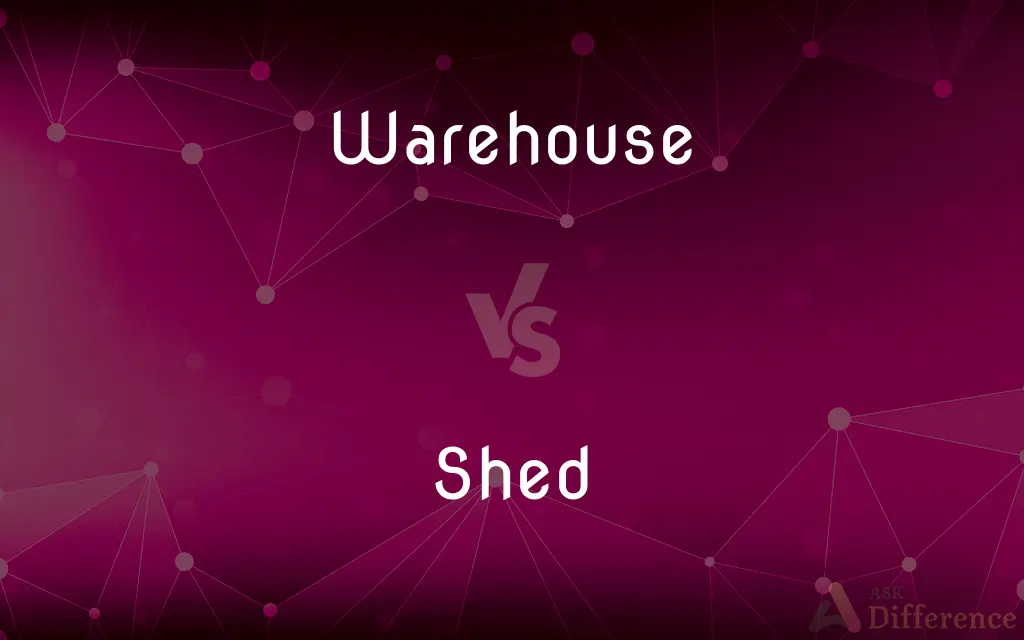Warehouse vs. Shed — What's the Difference?
By Tayyaba Rehman & Urooj Arif — Updated on April 2, 2024
A warehouse is a large building for storing goods, often before distribution, while a shed is a smaller structure typically used for storage or as a workshop.

Difference Between Warehouse and Shed
Table of Contents
ADVERTISEMENT
Key Differences
Warehouses are substantial commercial buildings designed for storing goods in large quantities, facilitating operations like loading, unloading, and sorting, often in the context of business or retail. Sheds, conversely, are smaller, often found in residential settings, used for storing garden tools, equipment, or serving as workshops or hobby areas.
While warehouses are integral to supply chains, supporting inventory management and logistics for businesses, sheds serve more personal or household storage needs, or as spaces for individual activities. This distinction highlights their differing roles in commercial versus personal use.
The construction of warehouses involves industrial standards, including reinforced floors, high ceilings for storage optimization, and dock facilities for trucks or shipping. Sheds, however, are simpler, constructed from wood, metal, or plastic, and may not require complex features or permits, depending on size and location.
In terms of scale, warehouses cover extensive square footage to accommodate bulk storage and transportation needs, including internal spaces for offices or processing areas. Sheds are much smaller, often only large enough to house tools, small machines, or serve as a workspace for one or two people.
Despite these differences, both warehouses and sheds aim to maximize the use of space for storage or activities. The choice between them depends on the scale of storage needs, the nature of items stored, and the intended use of the space.
ADVERTISEMENT
Comparison Chart
Purpose
Commercial storage and distribution.
Personal or household storage/workshop.
Size
Large, accommodating bulk goods.
Small, for limited storage or activities.
Construction
Industrial standards, complex features.
Simpler, with materials like wood or metal.
Use in Supply Chain
Integral for logistics and inventory management.
Not typically involved in commercial supply chains.
Location
Commercial or industrial areas.
Residential or personal property.
Compare with Definitions
Warehouse
Distribution hub.
E-commerce companies use warehouses as distribution hubs to manage inventory and fulfill orders efficiently.
Shed
Garden storage.
The family stores all their lawn care tools in a small shed in the backyard.
Warehouse
Logistics center.
The logistics company operates several warehouses that facilitate international shipping.
Shed
Hobby area.
The artist uses a shed as a quiet studio for painting and sculpting.
Warehouse
Industrial building.
The industrial park includes a warehouse designed for heavy machinery storage.
Shed
Outdoor storage.
The pool cleaning equipment is kept in a shed near the swimming pool.
Warehouse
Bulk goods storage.
Bulk grains are stored in specialized warehouses before being shipped to food processors.
Shed
Workshop space.
He converted his shed into a woodworking shop for his furniture-making hobby.
Warehouse
Commercial storage facility.
The new warehouse on the outskirts of town stores thousands of retail products for regional distribution.
Shed
Simple structure.
They built a simple metal shed to store their bicycles and outdoor gear.
Warehouse
A warehouse is a building for storing goods. Warehouses are used by manufacturers, importers, exporters, wholesalers, transport businesses, customs, etc.
Shed
A shed is typically a simple, single-story roofed structure in a back garden or on an allotment that is used for storage, hobbies, or as a workshop. Sheds vary considerably in their size and complexity of construction, from simple open-sided ones designed to cover bicycles or garden items to large wood-framed structures with shingled roofs, windows, and electrical outlets.
Warehouse
A large building where raw materials or manufactured goods may be stored prior to their distribution for sale.
Shed
A simple roofed structure used for garden storage, to shelter animals, or as a workshop
A bicycle shed
A garden shed
Warehouse
Store (goods) in a warehouse
The pallets were warehoused the following day
Shed
Park (a vehicle) in a depot
The buses were temporarily shedded in that depot
Warehouse
Place (a prisoner or a psychiatric patient) in a large, impersonal institution in which their problems are not satisfactorily addressed
Our objective is not to warehouse prisoners but to help inmates build new lives
Shed
(of a tree or other plant) allow (leaves or fruit) to fall to the ground
Both varieties shed leaves in winter
Warehouse
A place in which goods or merchandise are stored; a storehouse.
Shed
Discard (something undesirable, superfluous, or outdated)
Many firms use relocation as an opportunity to shed jobs
Warehouse
A large, usually wholesale shop.
Shed
Cast or give off (light)
The full moon shed a watery light on the scene
Warehouse
To place or store in a warehouse, especially in a bonded or government warehouse.
Shed
Accidentally allow (something) to fall off or spill
A lorry shed its load of steel bars
Warehouse
To institutionalize (a person) in usually deficient housing and in conditions in which medical, educational, psychiatric, and social services are below par or absent
"has felt forced to warehouse hundreds of children in temporary shelters" (Justine Wise Polier).
Shed
Eliminate part of (an electrical power load) by disconnecting circuits.
Warehouse
A place for storing large amounts of products. In logistics, a place where products go to from the manufacturer before going to the retailer.
Shed
To have (a growth or covering) be disconnected or fall off by a natural process
A tree shedding its leaves.
A snake shedding its skin.
A dog shedding its hair.
Warehouse
(transitive) To store in a warehouse or similar.
Shed
To rid oneself of (something not wanted or needed)
I shed 25 pounds as a result of my new diet.
Warehouse
(transitive) To confine (a person) to an institution for a long period.
Shed
To take off (an article of clothing).
Warehouse
To acquire and then shelve, simply to prevent competitors from acquiring it.
The warehousing of syndicated TV shows
Shed
To produce and release (a tear or tears).
Warehouse
A storehouse for wares, or goods.
Shed
(Archaic) To pour forth.
Warehouse
To deposit or secure in a warehouse.
Shed
To repel without allowing penetration
A duck's feathers shed water.
Warehouse
To place in the warehouse of the government or customhouse stores, to be kept until duties are paid.
Shed
To diffuse or radiate; send forth or impart
A lamp that sheds a lot of light.
Warehouse
A storehouse for goods and merchandise
Shed
To lose a natural growth or covering by natural process
The cats are shedding now.
Warehouse
Store in a warehouse
Shed
An elevation in the earth's surface from which water flows in two directions; a watershed.
Shed
Something, such as an exoskeleton or outer skin, that has been shed or sloughed.
Shed
The space made by raising certain warp threads on a loom and lowering others, allowing the woof to be passed between them.
Shed
A small structure, either freestanding or attached to a larger structure, serving for storage or shelter.
Shed
A large low structure often open on all sides.
Shed
To part, separate or divide.
To shed something in two.
To shed the sheep from the lambs.
A metal comb shed her golden hair.
We are shed with each other by an enormous distance.
Shed
(ambitransitive) To part with, separate from, leave off; cast off, let fall, be divested of.
You must shed your fear of the unknown before you can proceed.
When we found the snake, it was in the process of shedding its skin.
Shed
To pour; to make flow.
Shed
(transitive) To allow to flow or fall.
I didn't shed many tears when he left me.
A tarpaulin sheds water.
Shed
(transitive) To radiate, cast, give off (light); see also shed light on.
Can you shed any light on this problem?
Shed
To pour forth, give off, impart.
Shed
To fall in drops; to pour.
Shed
To sprinkle; to intersperse; to cover.
Shed
(weaving) To divide, as the warp threads, so as to form a shed, or passageway, for the shuttle.
Shed
To place or allocate a vehicle, such as a locomotive, in or to a depot or shed.
Shed
To woodshed
Shed
(weaving) An area between upper and lower warp yarns through which the weft is woven.
Shed
(obsolete) A distinction or dividing-line.
Shed
(obsolete) A parting in the hair.
Shed
(obsolete) The top of the head.
Shed
(obsolete) An area of land as distinguished from those around it.
Shed
(physics) A unit of area equivalent to 10−52 square meters; used in nuclear physics Category:en:Nuclear physics
Shed
A slight or temporary structure built to shade or shelter something; a structure usually open in front; an outbuilding; a hut.
A wagon shed; a wood shed; a garden shed
Shed
A large temporary open structure for reception of goods.
Shed
An automobile which is old, worn-out, slow, or otherwise of poor quality.
Shed
A British Rail Class 66 locomotive.
Shed
A slight or temporary structure built to shade or shelter something; a structure often open in front; an outbuilding; a hut; as, a wagon shed; a wood shed.
The first Aletes born in lowly shed.
Sheds of reeds which summer's heat repel.
Shed
A covered structure for housing aircraft; a hangar.
Shed
A parting; a separation; a division.
They say also that the manner of making the shed of newwedded wives' hair with the iron head of a javelin came up then likewise.
Shed
That which parts, divides, or sheds; - used in composition, as in watershed.
Shed
The passageway between the threads of the warp through which the shuttle is thrown, having a sloping top and bottom made by raising and lowering the alternate threads.
Shed
To separate; to divide.
Shed
To let fall; to throw off, as a natural covering of hair, feathers, shell; to cast; as, fowls shed their feathers; serpents shed their skins; trees shed leaves.
Shed
To cause to flow off without penetrating; as, a tight roof, or covering of oiled cloth, sheeds water.
Shed
To sprinkle; to intersperse; to cover.
Shed
To divide, as the warp threads, so as to form a shed, or passageway, for the shuttle.
Shed
To fall in drops; to pour.
Such a rain down from the welkin shadde.
Shed
To let fall the parts, as seeds or fruit; to throw off a covering or envelope.
White oats are apt to shed most as they lie, and black as they stand.
Shed
An outbuilding with a single story; used for shelter or storage
Shed
Get rid of;
He shed his image as a pushy boss
Shed your clothes
Shed
Cause or allow (a solid substance) to flow or run out or over;
Spill the beans all over the table
Shed
Cast off hair, skin, horn, or feathers;
Out dog sheds every Spring
Shed
Shed at an early stage of development;
Most amphibians have caducous gills
The caducous calyx of a poppy
Common Curiosities
Can a shed be used for commercial purposes?
Yes, a shed can be used for small-scale commercial activities, though it is more commonly associated with personal or household use.
What security measures are common in warehouses?
Warehouses often have security measures like surveillance cameras, security personnel, and controlled access systems to protect stored goods.
Can a warehouse function as a manufacturing space?
Some warehouses are equipped with areas for light manufacturing, assembly, or customization of goods before distribution.
What types of goods are stored in a warehouse?
Warehouses store a wide range of goods, including retail products, raw materials, and bulk items, depending on the industry.
Can sheds be customized?
Yes, sheds can be customized for various uses, including workshops, hobby areas, or specific storage needs.
Are warehouses always part of a larger supply chain?
While not all warehouses directly connect to a supply chain, they typically play a crucial role in the storage and distribution process for businesses.
How do climate control features differ between warehouses and sheds?
Warehouses may have climate control for sensitive goods, while sheds typically do not, unless specifically outfitted by the owner.
Is it more expensive to maintain a warehouse or a shed?
The cost of maintaining a warehouse is generally higher due to its size, complexity, and the value of goods stored, compared to a more modest shed.
Do sheds require building permits?
Depending on the size and location, sheds may require building permits, though the regulations are usually less stringent than for commercial structures like warehouses.
How do environmental regulations affect warehouses?
Warehouses, especially those storing hazardous materials, must comply with environmental regulations to prevent contamination and ensure safety.
Share Your Discovery

Previous Comparison
Dichotomy vs. Trichotomy
Next Comparison
Contest vs. TournamentAuthor Spotlight
Written by
Tayyaba RehmanTayyaba Rehman is a distinguished writer, currently serving as a primary contributor to askdifference.com. As a researcher in semantics and etymology, Tayyaba's passion for the complexity of languages and their distinctions has found a perfect home on the platform. Tayyaba delves into the intricacies of language, distinguishing between commonly confused words and phrases, thereby providing clarity for readers worldwide.
Co-written by
Urooj ArifUrooj is a skilled content writer at Ask Difference, known for her exceptional ability to simplify complex topics into engaging and informative content. With a passion for research and a flair for clear, concise writing, she consistently delivers articles that resonate with our diverse audience.
















































